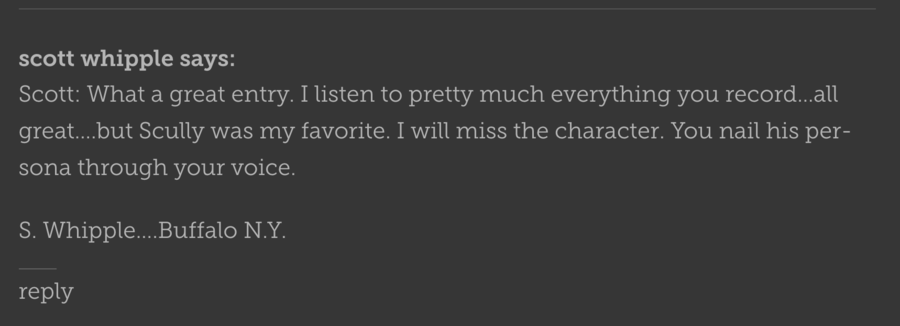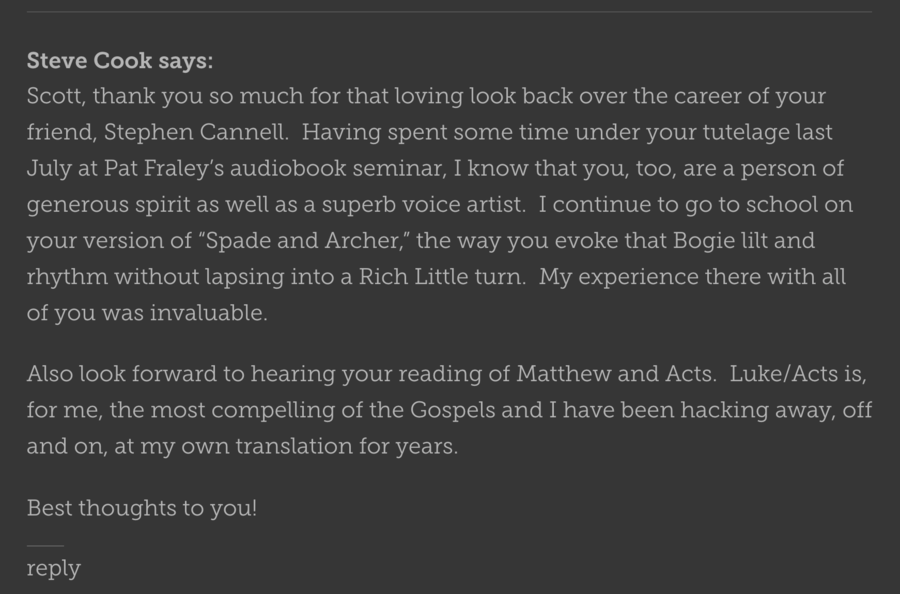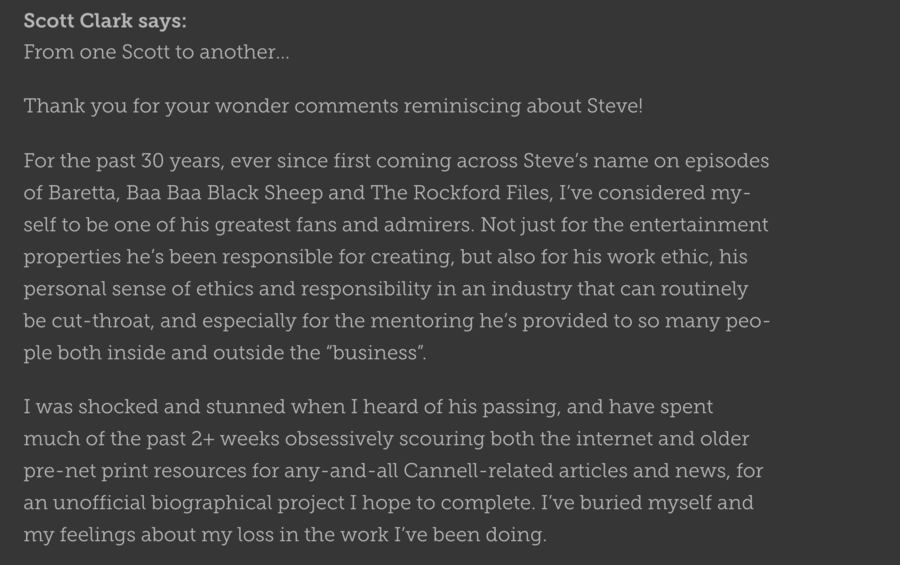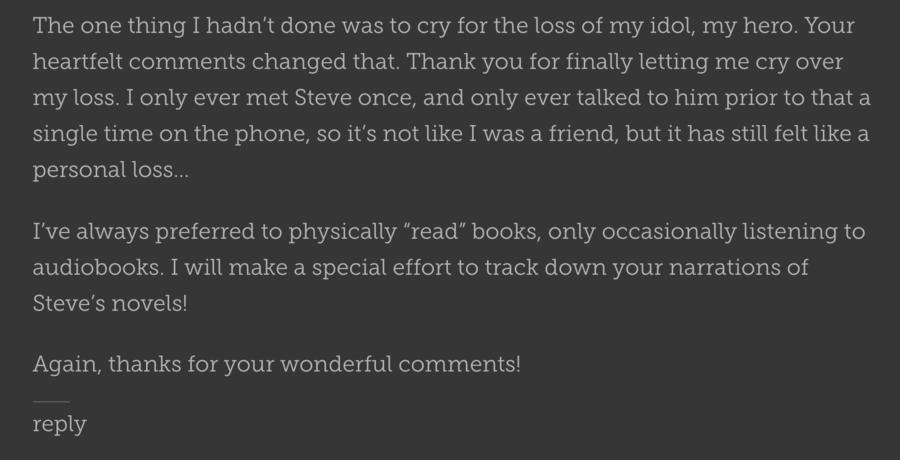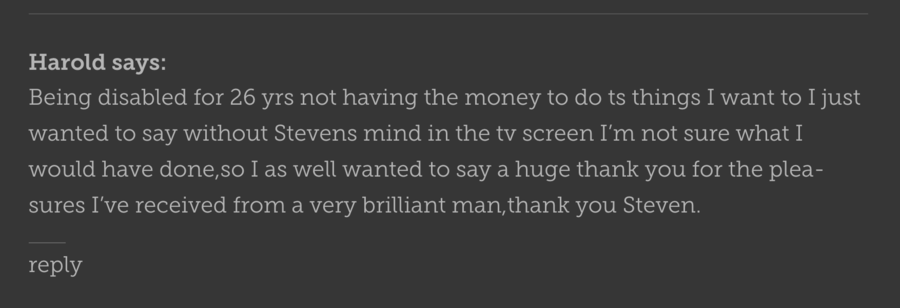A few weeks ago, on the night of Thursday, September 30, 2010, a friend and I got to talking on the phone about Stephen J. Cannell. I was telling him the story of how I met Cannell several years ago while narrating one of his books. For about a half hour, I was effusive in my praise, stating that without doubt, Stephen J. Cannell was the most generous man I’ve ever met, and having met a number of very generous souls in my career, that was saying something. Twelve hours later, I learned that Stephen had died that night.
I felt like I’d been kicked in the stomach.
Far more than just a hero for the work he’d accomplished in television, Stephen was also the most passionate man I’ve ever known in the way he approached his life, someone for whom success would always be second to his family and his friends. And when his colleagues gathered to say farewell at his memorial, I realized that my impression of him was exactly the same as theirs: rather than make any mention of his phenomenal TV success, they spoke instead about the love he showed his family, and the passion with which he lived his life.
People familiar with his work are aware of the unique place he occupies in the TV pantheon -- at one point his production company had so many shows on TV that they employed over 2,000 people -- but fewer are aware of how much adversity Cannell had to overcome in order to achieve it. Born in an era where the concept of dyslexia was utterly foreign, where instead of being understood you were merely labeled stupid or lazy, Stephen was advised by nearly everyone he knew to follow in his father’s footsteps and take over the family furniture business. Given the extent to which Stephen suffered from dyslexia, it seemed sage advice. Yet his passion was writing, and it would not be denied.
Despite a tremendous amount of personal rejection he persevered and sold his first TV script in 1968 to IT TAKES A THIEF. Just three years later, he became story editor onADAM 12, and just three years after that, created THE ROCKFORD FILES -- soon to be followed by THE A-TEAM, THE GREATEST AMERICAN HERO, WISEGUY, 21 JUMP STREET, and many others.
After several decades of this furious creative pace, Stephen focused his energies on what had been the dream of his youth: to become a bestselling author. Of course, he brought that same awe-inspiring energy he’d turned on his TV endeavors to his fiction, crafting 17 novels in a 15-year span. Although several are stand-alones, it was the character he created in THE TIN COLLECTORS (2000), Detective Shane Scully, that would capture his audience’s heart. Ultimately, he wrote ten novels in the Scully series, each one of them eagerly anticipated by his legion of fans. (See this sidebar for a list of Stephen’s novels.)
Stephen narrated several of his early novels himself, but with his dyslexia, he never enjoyed the process much. By the time he wrote his fourth Scully novel, VERTICAL COFFIN, in 2004, he decided that it was time to get a new narrator, and it’s here that my path crossed Stephen’s for the first time.
Stephen J. Cannell with wife Marcia and daughters Tawni (L) and Chelsea (R) (son Cody not pictured).
I got a call early in 2004 from his publisher, asking me if I’d be interested in recording a book written by Stephen J. Cannell. A lifelong fan of THE ROCKFORD FILES, and especially of WISEGUY, I leapt at the chance. “Sure,” I said, “count me in. When do we start?” They’d get back to me, they said, he “just wanted to know if you’d be willing to do it.” My jaw hit the floor. “You mean Cannell asked for me, personally?” I asked. “Yeah,” they replied. I couldn’t quite get over the fact that the guy I idolized in my youth knew who the hell I was. It’s still hard to fathom it.
I recorded VERTICAL COFFIN soon thereafter, as well as his next title, COLD HIT, but it was in 2006 when I began working on WHITE SISTER that Stephen and I met for the first time. He got in touch and asked if I’d be willing to do an interview with him, something we could record and attach to the end of the audiobook. Absolutely, I assured him, I’d love to. One more thing, he added, would you be willing to have me bring a video camera and record it? Heck yeah, I told him as soon as I caught my breath, I’m there.
That day turned out to be one of my favorites of all time, though it wasn’t without problems. We’d already finished recording the book by then, and I was well into my next title, which I was really under the gun to get finished. I took a morning off from my recording schedule, one that was really tough to make time for, given that crazy deadline pressure. When I got to the studio, I remember seeing Stephen walking toward me, a huge, overpowering presence: he had a huge grin, a mane of well-coiffed hair, and a big powerful handshake, all of which he turned on me. “Scott, I can’t tell you how great it is to meet you, I’m a huge fan of yours.” I was stunned that he’d taken my line.
For me this was a return to a job I’d done several times before; as I’ve written here in previous blog posts (here and here), I spent years writing magazine articles, and had conducted easily five hundred interviews during that time. We covered all sorts of things: his mammoth TV success, his passion for writing fiction, the issues with dyslexia he always had to contend with. And whereas I can’t recall the questions or answers with tremendous clarity, what I remember clearly was what he talked about between camera takes: his family. He asked if I’d ever been married, and I replied no, I’d come close a few times but had never taken that big step. He smiled hugely, nearly blinding me with those startlingly white teeth, and told me family is what life is all about, this in such a way that it was clear he was really saying, ‘Get off your ass, kid, take the plunge, you won’t regret it.’ He told me about his wife and kids, how proud he was of all of them, and how much joy they all brought to his life. It was a beautiful moment in a day that would be filled with them.
What happened next still amazes me. I told him I’d run out of my questions, and basically began winding up the interview, trying to put a button on it. “Well, I’ve got a few of my own for you,” he said, pulling out a clipboard, and then proceeded to interview me. It was the most gracious thing I’d ever experienced. Here was a guy who’d achieved so much success, yet who didn’t mind sharing the spotlight at all, who actually enjoyed turning it away from himself to shine fully on someone else.
For those of you who’ve never worked in Hollywood, trust me when I say, this is rare. Rare, and delightful.
He asked me about my writing, having seen online that I’d been hired twice as a screenwriter, adapting a science fiction novel for the big screen. He encouraged me to talk about this at length, reminding me, “Hey, producers might wind up listening to this audiobook, Scott. Sell yourself.” I did so, though haltingly, unprepared for this moment as I was. When he asked if I had other ideas all my own, rather than just adaptations, I said yes, but little else. Again, he prodded me, saying he was sure those producers would love to know more about those, as well. And it suddenly struck me that Stephen was doing his damnedest to help me get hired for more work. In Hollywood, producers are always asking, “So what else you got, kid?” Your next idea is your ticket to your next paycheck, you should always be ready to talk about them at the drop of a hat, and he was schooling me to do so now. Again, I was overwhelmed at the generosity of it all.
My one regret of the day came when we were finished, and he asked if I’d like to go grab lunch with him. I stammered that I was booked that afternoon, and had to finish up this other title. I could tell he was disappointed, which flattered me, but also that he respected my work ethic. I told myself, hopefully there’ll be other opportunities for lunch.
Sadly, there weren’t. I ran into him several more times, at book signings or the LA Times Book Fair, but circumstances just weren’t quite right, never as right as they would be that day in the studio. He stayed in touch with the occasional phone call or email from his office. When he wrote a stand-alone novel with a somewhat sinister lead character two years ago, AT FIRST SIGHT, he called me to discuss how he saw this guy being played, giving me some personal direction that I truly cherished. Later, when he saw the audiobook had received a great review in PUBLISHERS WEEKLY (“Brick’s uncanny ability to tear words from the page and breathe life into them is almost scary, and the end result is perhaps one of the best commercial thriller audio books in recent memory”), he sent me a lovely note and a bottle of champagne. He even came close to attending a party at my home, though got called away by other commitments. So close, yet so far.
About a year ago, I was coming up on my ten-year anniversary in the audiobook business, and my friends and co-workers here at Scott Brick Presents decided to throw me a surprise party. For it, my manager Gina Smith reached out to a number of the authors whose work I record, asking them for a quote to put in a commemorative book she made for me. The book was published privately and I’ve never shared what any of the authors wrote, but I’ve included Stephen’s words here, because I treasure them:
I used to read my own books. I’d show up at the recording studio around seven A.M., sit on a stool, try and get that old diaphragm tucked up tight under my rib cage so I could project properly, and then I’d let fly. I always had my characters’ voices all worked out. My hero would sound like Casey Kasem. The heavy would growl in a sort of George C. Scott, Patton-esque imitation. The girl… well, the girls were always a bit harder. I’d tighten my belt three notches, forcing my voice up three octaves. Ten hours later, I’d leave with a blinding headache and a call time for seven A.M. tomorrow.
It was brutal.
One day, I said to myself, why am I doing this? There are stupid, broke people all over L.A. who will scoop up this gig and do it for me. Enter Scott Brick.
Scott has taken this baton, or maybe it was a box mic, and run with it. He has freed me from this god-awful chore. He also happens to be much better at it than I ever was. In the eight or nine books since I stopped doing this, I’ve not gotten one call or piece of mail begging me to return to that stool. Not one note that says, ‘I love it when you read your own books.’ Oh well, I guess some changes are blessings.
Add to all this the fact that Scott is one of the really good guys, and voila, before you know it, you have ten years in recorded books. Time really flies when you’re perched on a stool with your diaphragm tucked up under you.
Scott, you are a treasure. Thanks for all the great reads. Don’t ever give me that damn mic back.
Your bud,
Steve (Stephen J. Cannell)
p.s. I’m not so sure Shane Scully should lisp. Let’s talk…
Heh heh. Broke, stupid people. That Steve, what a kidder. The night of my actual ten-year anniversary, I opened that bottle of champagne he’d sent me the year before. What a gift.
This past Easter Stephen was diagnosed with Stage 4 melanoma. The following day they learned the cancer had spread to his brain. He underwent radiation and chemotherapy, and continued to work, I’m told, on his next Shane Scully novel. Soon he participated in a new form of treatment that was showing promising results, but ultimately became ill from the side effects and needed to be hospitalized. In their email after his passing, his family wrote, “In the end, he decided to leave the hospital and go home to live his last days in peace, resting comfortably in his house, with football on the big screen and his family at his side.”
Despite never having met his family, or the lovely folks at the office who’d pass along our messages, I was invited to pay my respects at his memorial, and it was overwhelming. Never have I seen so many celebrities, yet none of them spoke about the entertainment industry that day. They all just talked about how much Stephen loved his wife -- his Junior High sweetheart, Marcia -- and his kids, Derek, Tawnia, Chelsea and Cody. (Actors, writers and producers NOT talking about Hollywood. For those of you who don’t live in Los Angeles, I hope you can appreciate how unique that is.) More than anything else, what people talked about was Stephen’s personal mantra: do whatever it takes to be happy. There’s never a good enough excuse not to.
I share all of this with you today, on Tuesday, October 12, as it is the day that Stephen’s final Shane Scully novel, THE PROSTITUTE’S BALL, comes out on audio. It’s a great story, one that combines the great loves of Stephen’s life, fiction and television, in a fashion that only he could. In so many ways, it’s the book he was born to write. And more than anything else, if these are to be the final words we have from Stephen, they’re a fitting memorial. Without giving anything away, the ending is a wonderful final scene, a lovely way to say goodbye to a beloved character, as well as the great man who created him. I hope you’ll give it a read, or give it a listen, and say your own personal farewell.
Take care, Stephen. Thanks always, for all your kindness and generosity. I’ll remember it always, and I’ll forever be grateful.
Thanks for listening,
Scott Brick
